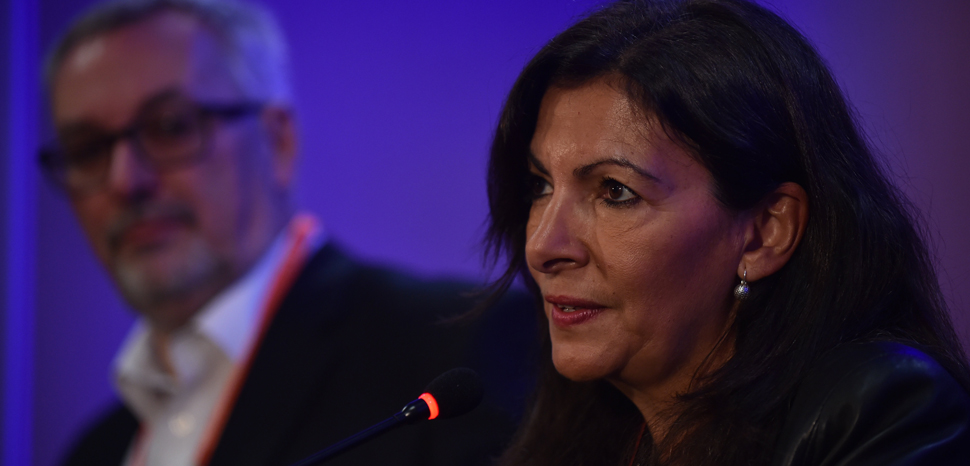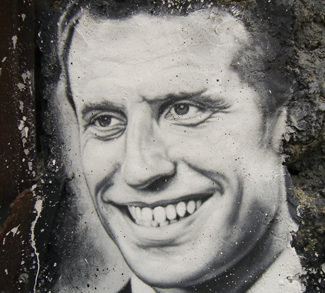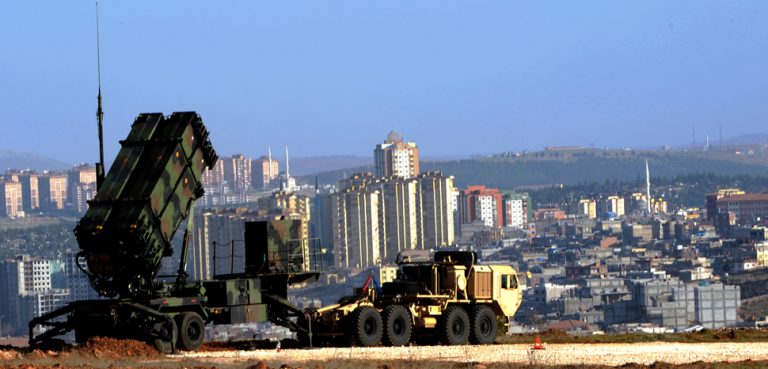When Anne Hidalgo swept into power the evening of March 30, 2014, it came at a time when her party and principles faced the real possibility of political irrelevance. The unpopular presidency of Socialist Francois Hollande, who’s job approval had notoriously tanked to 13%, had even cost her party participation in the second-round of presidential voting in 2017. That same year, independent Emmanuel Macron’s elevation to the presidency all but cemented the imminent danger that the French Left was facing.
Then, Hidalgo won.
An immigrant, a woman, and a staunch Socialist; three things that seemed like a handicap in the political climate of 2014. But Hidalgo carried the night with 53% of the vote, trouncing her right-wing rival Kosciusko Morizet by a margin few thought possible given the downward trajectory of her party.
But for the native Catalonian, whose family had fled Francisco Franco’s brutal regime in the 1960s, the fight to win back the disenfranchised voters of Paris was a task she took to with passion.
“Her success is a mirror of the values of the République” Anne Laffeter, a political reporter at Les Inrockuptibles, remarked shortly after the election “She proves that that the traditional path to success, based on public schooling, hard, humble work, and no connections is still possible today, which is deeply reassuring.”
Growing up in Lyon, Hidalgo’s father was an electrician and her mother a seamstress, something she claims taught her the value of hard work. A proficient student who studied labor law, she was a workplace inspector before entering politics.
Her campaign promises, and the vision she shared of a modern Paris, reflected her upbringing and sympathy for the French middle-class. She committed to increasing housing development, with such ambitious plans as committing to building 7,000 low-income residences. For much of the city’s older, whiter population, those same ambitions were threatening. Her agenda faced bitter protest in the 16th arrondissement during the campaign, with her frequent presence in the district trying to convince local residents of her plan’s viability becoming somewhat of a nuisance. The former deputy mayor also promised to further discourage automotive transportation, as well as fight pollution and combat overcrowding in the city.
For the most part, Hidalgo has delivered on those promises. The question that faces French voters now, as her re-election bid looms in a week, is whether the changes she delivered were in their best interest. As promised, her war on cars has been largely successful, with only 35% of Parisians claiming ownership of an automobile. A move that some in the city view with disgust.
“She’s a hysteric,” Hamza Hansal, owner and proprietor of a fleet of 10 taxi cabs, told the New York Times in October “Nothing but bicycle lanes and construction sites. Total chaos. Such BS. Traffic jams 24/7.”
Others, like Lorelei Limsoun, a leading expert on climate policy, says Hidalgo’s plans signal a massive improvement. “The mayor was elected to make positive change with mobility, and these kinds of policies to reduce space for cars in favor of other modes of transport,” he told the press. “So it’s important to say that it’s quite coherent with the votes of the people in Paris. And when you see the polls about the pedestrianization of the riverbanks, the majority of people are in favor of it.”
Even amongst her critics, nobody doubts her commitment to these reforms. In 2016, the Georges Pompidou highway, winding elegantly next to the Seine River, was crammed with citizens frantically trying to make their daily commute. In just a year, the highway was entirely transformed into a car-free walk site, lined with playgrounds, coffee shops, and bike lanes. In January of that same year, Hidalgo’s government banned the daytime use of diesel-fueled cars, and the city started running trials of a driverless electric shuttles in dedicated lanes between two train stations. A new bike path opened in the middle of the Champs-Élysées, part of a plan to double bike lanes from roughly 430 miles in 2015 to 870 miles by 2020. Through her reforms, Paris went from the 17th in 2015 to the 8th most bike-friendly city in the world in 2019.
Hidalgo, a renowned environmentalist, says these drastic reforms are necessary to combat global warming, which kills almost 50,000 people a year in France. “What we’ve undertaken is a whole program of adaptation, of putting nature back in this city,” She told NYT’s Adam Nossiter. “We’re trying to build this around the individual. But change is difficult.” “We can’t live as before,’’ Ms. Hidalgo added. “There’s been an acceleration in climate change.”
As the Mayor stares down a close election this coming week, she’s been forthcoming about what a second-term would look like. The corner stone of another five years in office? The ‘15-Minute’ city.
While most of us don’t fully appreciate it, being in a position of geographic convenience is nothing short of a luxury. Few can afford real estate close enough to their place of employment; much less family and loved ones. This ailment adversely affects urban populations, such as in New York City, where the average person spends 43 minutes getting to work every day.
Hidalgo envisions through her policies a post-car city where through a diverse system of walk-paths, bike-lanes, and a powerful public transportation system, the average Parisian could get anywhere in about 15 minutes.
“It’s a city of neighborhoods where you can find everything you need within 15 minutes from home,” she tweeted in January. “This is the condition for the ecological transformation of the city, while improving the daily life of Parisians.”
“The quarter-hour city would reduce two serious problems plaguing many Parisians: the air pollution that kills 3,000 people a year, which is largely caused by car traffic, and the many hours lost in transport suffered to go to work,” says Delphine Grinberg, a member of Paris Sans Voiture, “Many of my colleagues spend two to three hours on transportation to work each day. I am fortunate to live 15 minutes by bike from work. During the recent transportation strike, I hosted exhausted colleagues in my home.”
The idea is anything but radical, although acutely necessary, seeing as how the average Parisian spends almost an hour trying to get a work each day. In Ottawa, Canada, the city government proposed a similar plan in 2019, and the concept is becoming increasingly popular in South American cities, where many residents are low-income and can’t afford reliable automobiles.
Hidalgo’s first years as mayor were marked by more than just progressive reforms. Her first term saw cruel terrorist attacks on the Charlie Hebdo newspaper and the Hyper Cacher supermarket, multiple record-breaking heat waves, and two major floods.
“It’s not been a very easy time. We’ve had some terrible shocks and catastrophes, lots of events that could not have been foreseen: terrorism; a massive influx of refugees and migrants and an acceleration of the climate emergency,” she told The Guardian. “It’s not enough to want to be mayor of Paris because it’s fun or because you are running this magnificent city, you have to have broad and solid shoulders. It’s been like piloting a catamaran in an almost permanent force 7-9 wind for six years.”
Yet despite the struggles, ‘Madame la Maire’ as she is called, is firm on seeking re-election.
“You have to ask, why do I want to be here, when I could be doing something a little easier? You have to work on your relationship with power … then you have to be methodical and rational, criticize, analyze before acting, understand, ask questions around you and of yourself, and once you have decided on a path, follow it. Otherwise, you are just a headless chicken,” she says.
It’s been almost six years since that chilly night in March when Hidalgo ascended to power, but through the challenges she has faced, it’s significance still touches the lives of over two million Parisians every day. But now, less than a week away from a referendum on Hidalgo’s first term, the stakes seem higher than ever. And the people know it.
If you’ve ever found yourself in the 18th arrondissement of Paris, you’d be sure to have an intimate view of the iconic Montmartre hill, which is home to a vibrant community of elderly Parisians. Amongst them is Viviane, a 78-year old mom of two and former teacher who’s been an ardent fan of Hidalgo from the beginning. But that hasn’t blinded her to the challenges the city still faces, which range from the struggles of commuting to housing costs.
“There is still some work to follow through on,” she told France24 in January. “While things have improved with the number of bicycle paths, they aren’t always practical. Especially the ones designed to go against the flow of traffic.” “We are currently renting and are looking for an 80m² apartment in the 18th arrondissement. And you need to pay between €14,000 and €15,000 per square meter for a beautiful home in the very touristy Montmartre neighborhood. Even with a €1.2 million budget, we aren’t finding it.” Vivane told the journalists that tourism was mainly to blame, especially Airbnb. “Across the street from me, one whole building was just sold off to create Airbnb tourist rentals. It makes market prices rise considerably for Parisians looking to house themselves.”
But the mayor has her supporters as well. In the 12th arrondissement lives Solveig, a 40-year old single mother of three. She spoke to France24 about Hidalgo’s record. “It’s super,” she says. “I’ve always been Socialist and I really like Anne Hidalgo. Because she stayed faithful to the Socialist Party when so many others didn’t. But I also like her for her management of the city.”
In particular, Solveig, like many of the working-class in Paris, is a strong supporter of the housing reforms, especially when contrasted with her own struggles as a single parent. “I’m renting and I registered a request for social housing years ago. But my dossier still hasn’t amounted to anything. All the offers I’ve received haven’t matched my criteria.”
The 2020 campaign for the mayor’s seat, in a very genuine representation of French national politics, has been filled with scandal and intrigue. Hidalgo, who faces a serious challenge from her right-wing counterparts, has so far fared relatively well in the competition. President Emmanuel Macron’s centrist party, La République en Marche, has seen the ouster of Hidalgo’s as pivotal to shoring up recent losses in local elections around the country.
However, fate hasn’t been kind to Macron and his party. En Marche’s original contender and personal friend of the President, Benjamin Griveaux, had to withdraw after leaked explicit videos involving the candidate began surfacing online. In the frenzy, MP Cédric Villani, another personal friend of President Macron, jumped into the race against Macron’s wishes. So far, Villani is peaking at 8%, possibly stealing a large portion of right-wing votes needed to defeat Hidalgo.
Griveaux’s official replacement, French health minister Agnes Buzyn, quickly stepped into the void. “I am doing this with my heart, with commitment,” Ms. Buzyn told the press shortly after the announcement.
As a result of the chaos, the right-wing, a week out from the election, has found itself splinted. Buzyn is polling in third at 18%, behind another discouraged conservative challenger Rachida Dati. The former justice minister under President Nicholas Sarkozy is projected to tie with Hidalgo in the first-round, according to Politico. The fact that two conservatives have outright ignored Macron’s plea’s for party unity, and that En Marche’s official candidate probably won’t make it to the final round, has been nothing short of a national embarrassment for the president.
For many Socialists, Hidalgo represents the future of left-wing politics in France. If she wins a second term, the first female mayor of France would be in a prime position to run for the presidency in 2022 – a political maneuver not without precedence. Jacques Chirac, who was mayor of Paris for roughly 18 years, successfully ran for president from that office in 1995.
Yet, customarily for a politician in the country, she has continuously denied interest in occupying the Elysee Palace.
“My job is to transform this extraordinary, magnificent city without damaging it. To make it a city agreeable to live in but one that is a model that inspires, without denying its history,” she said in a recent interview.
“It comes down to values. In a worrying, anxious-making, changing world, values are the only compass. When I’m not sure what to do, when I have low points, I refer back to my values, I ask myself: Why do I want to do this or that, what is in the general interest? When you are mayor of Paris you have to think about more than yourself.”
Any examination of Paris under Anne Hidalgo reveals a tireless, dedicated push for change, regardless of its political expediency, in an age when many politicians avoid any reforms that would put their office in jeopardy. It’s up to Parisians on March 15th to decide whether or not her bravery is something they’d like to continue to see in power. Regardless of the outcome, Hidalgo’s aggressive tenure has shown us that it is possible to govern as an idealist, while still compromising if needed, to reach a grandiose, final call.
The views expressed in this article are those of the authors alone and do not necessarily reflect those of Geopoliticalmonitor.com or any institutions with which the authors are associated.




